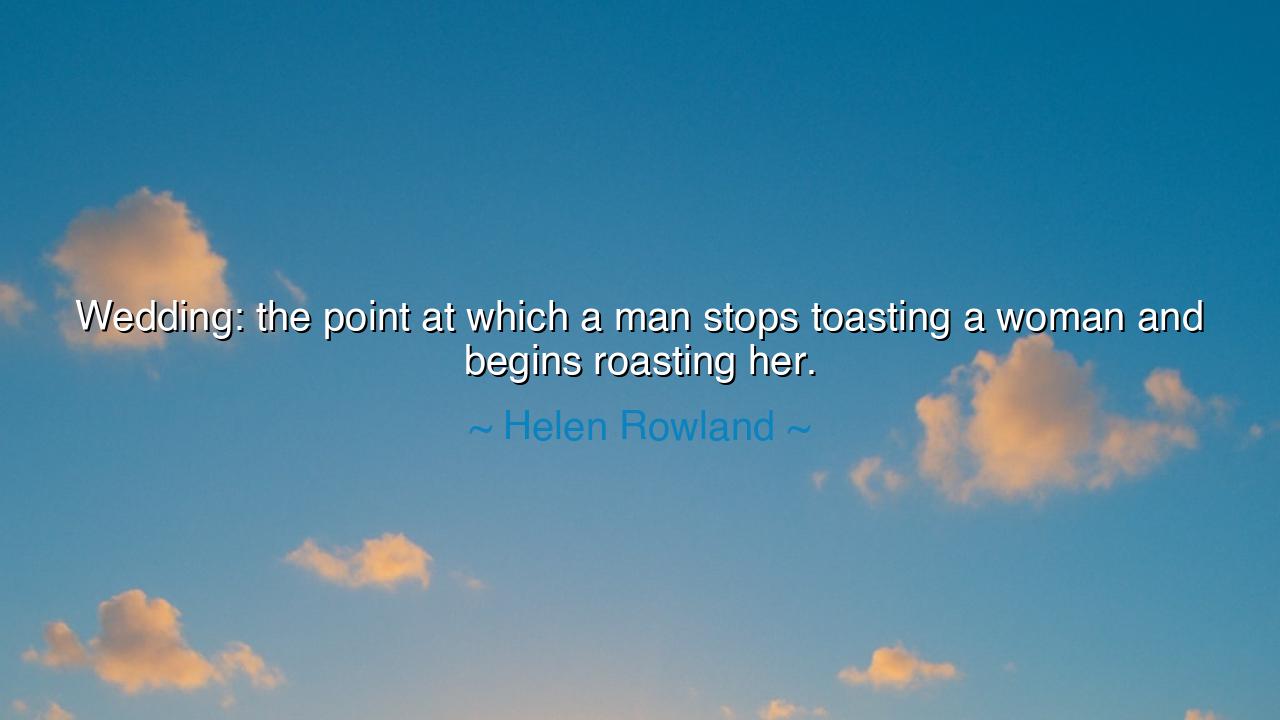
Wedding: the point at which a man stops toasting a woman and






The words of Helen Rowland—“Wedding: the point at which a man stops toasting a woman and begins roasting her.”—are wrapped in wit yet sharpened with truth. They speak of the shift that often comes when the fire of courtship cools into the hearth of marriage. Before the wedding, the woman is exalted, praised in every word, her virtues magnified in song and speech. Afterward, the familiarity of daily life breeds not only comfort but jest, and sometimes mockery, as affection takes on a different, less ceremonial form.
This utterance reflects the paradox of love and marriage. In pursuit, the lover adorns his beloved with endless praise, seeking to win her heart with sweet words and high honors. Yet once the bond is sealed, the tone may change: light teasing, even sharp humor, replaces the lofty toasts of courtship. Rowland, with her keen wit, unmasks this irony—not as pure cynicism, but as commentary on the ways love transforms under the weight of permanence.
History offers us the tale of Socrates and Xanthippe, his famously strong-willed wife. In Athens, it was said that Socrates endured her sharp words with patience, and when others asked why he married such a difficult woman, he replied that if he could live with her, he could live with anyone. Their marriage was marked not by endless toasts, but by constant roasting, each shaping the other through conflict and jest. It is a reminder that the bonds of marriage are often less about romance’s exaltation, and more about the endurance of two spirits locked together.
The quote also illuminates the human tendency to take for granted what is already won. The chase inspires poetry, while possession inspires banter. What was once elevated becomes ordinary, and what was untouchable becomes the subject of laughter. Yet within that jest may still lie affection, for to “roast” with humor is often to show intimacy. Rowland’s cleverness lies in exposing both the fading of idealization and the deepening of familiarity.
Let this wisdom endure: do not let the wedding be the end of reverence. Let the toasts of praise continue even when the vows are spoken, lest affection wither into scorn. Humor is a gift within marriage, but let it be tempered with tenderness, so that the laughter does not wound but binds. As Helen Rowland teaches with her biting wit, marriage transforms love’s language—but it is up to each soul to ensure that in the shift from toasting to roasting, the flame of respect still burns.






TNTran Thien Nhan
Rowland’s wit here is both funny and cutting. It’s a reminder that marriage changes the way people express affection. What begins as grand gestures often becomes playful banter—or sometimes irritation. I’m curious if this shift is inevitable, or if couples can maintain that sense of admiration even decades in. Maybe the secret lies in learning to roast each other lovingly, without forgetting the reason you toasted in the first place.
MVVo Nguyen Minh Vuong
This quote feels like vintage humor—sharp, observational, and a little jaded. It reflects that timeless truth about how romance and routine collide after the honeymoon phase. But I also think there’s affection buried in the joke. Maybe the ‘roasting’ isn’t cruelty but familiarity—the kind of teasing that comes with comfort and shared history. Still, I can’t help but ask: does every couple risk losing tenderness to routine humor?
SQSen Quyen
I love how this line blends humor with social commentary. It’s funny, but it also highlights how relationships evolve after marriage—from idealization to everyday reality. Maybe Rowland was hinting that comfort can breed honesty, even sarcasm. Still, I wonder if it’s fair to say love always shifts from toasting to roasting. Could it be that humor, when gentle, actually keeps relationships alive rather than diminishing them?
TLNguyen Thi Le
This quote made me laugh because it’s so sharply witty, but also a bit cynical. Helen Rowland clearly had a knack for exposing the humor in marital dynamics. It makes me wonder if her comment reflects the fading romance that often follows marriage, or if it’s just playful teasing about how familiarity changes love’s expression. Do people really take their partners for granted once the vows are exchanged, or is that just an old stereotype?